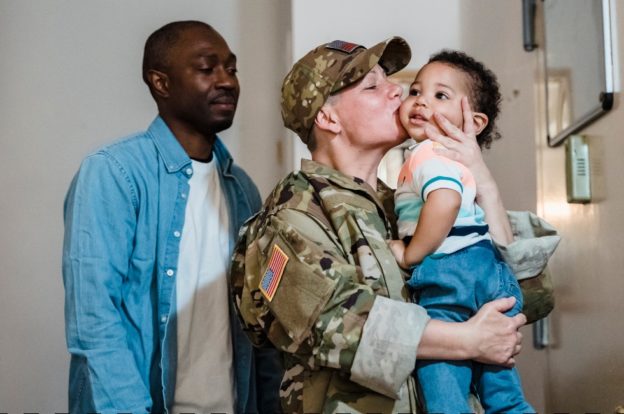Women serving active duty in the military, veterans, or with partners or spouses in the military experience things that civilians do not. In addition to the everyday stressors, they face combat, separation from their family members for long periods, and the possibility that they or their spouse may not ever make it back home. Can the additional stress caused by military life lead to addiction?
Withstanding the Pressures of Deployment
Deployment is a challenging time for everyone and is made worse when two partners are in the military and serve in different places. For those who are deployed, every day is filled with the stress of not only being away from home but existing in a state of hyper-awareness due to the dangers of combat. Even for those who do not see war, the fight-or-flight mechanism in the brain can remain triggered while deployed and can in and of itself be traumatic.
The women who stay behind during deployment must take on the role of both partners, which is even more complicated when there are children. They live every day on edge, knowing that at any time, they could get that phone call. These stressors are far more intense than the average civilian’s life.
The Trauma of Combat
Combat is brutal. There is no need to mince words. According to one 2010 study on the prevalence of trauma in the military, up to 31% of those in the U.S. military who saw combat were later diagnosed with Post-Traumatic Stress Disorder (PTSD), which is significantly higher than the general population.
Even for those who do not actively fight in battle, the personnel in support or otherwise witness combat experience higher rates of depression, trauma, PTSD, and suicidality.
Dealing With Gender Inequality
For women in the military, gender inequality creates another dimension of trauma. Not only are women subjected to discrimination, but they also face sexual harassment, threats, and assault. In a study published in 2018, researchers found that 52.5% of women in the military reported experiencing sexual harassment while serving. The study also indicated that 23.6% of women reported having been sexually assaulted during their time in the military. These staggering statistics paint an ugly truth about trauma and the related mental health issues that women in the military face.
Depression, Anxiety, PTSD, and Suicidality
Women in the general population are about twice as likely as men to suffer from depression. That rate goes up for women who have experienced trauma, particularly sexual trauma. Anxiety is another mental health concern that is more common for women who serve or have a spouse serving in the military.
Trauma that goes untreated can become PTSD. The symptoms of PTSD are both psychological and physiological and can significantly impair daily life. Due to the considerably higher rates of sexual trauma even in the general population, women are more than twice as likely as men to develop PTSD.
According to a report from The White House, women who have served in the military are twice as likely to commit suicide as civilian women. The rates of suicidality, or having thoughts of suicide, are much higher.
Using Substances to Cope
Women in the military clearly have extenuating circumstances they face, leading to the use of substances to cope. The rates of mental health issues such as depression, anxiety, PTSD, and suicidality can also cause women to use substances in an attempt to cope with the symptoms. They also face much higher rates of injury and pain, leading to potential addiction to pain medications and opioids.
Because discrimination, stress, and trauma rates are so much higher amongst military women and veterans, the use of substances is much higher. Using addictive substances can lead to addiction, which is why there are so many women in the military with substance use disorders.
How Women in the Military Can Find Help
All military branches have become much more aware of the particular challenges that women who are serving face. Addiction and co-occurring mental health disorders are serious concerns, and women can seek treatment with less fear than ever before regarding their privacy or other related issues.
Military insurance known as TRICARE covers mental health and substance abuse treatment. Certain addiction treatment facilities which offer trauma-informed care are authorized to accept TRICARE, making it more convenient for active-duty women, veterans, and their spouses to seek help for substance use disorders. These brave women who suffer so much on all fronts can now find the real help they need.
Can the stress of military life lead to addiction? Indeed, women in the military face more stressors than their civilian counterparts, and research demonstrates that they do, in fact, have higher rates of depression, anxiety, PTSD, and suicide. Unfortunately, these lead to much higher rates of addiction as well, but there is hope. Facilities such as The Ho Tai Way – Recovery For Women offer trauma-informed care for women in the military. We are authorized to accept TRICARE and have experience treating women in the military, spouses, and veterans. Our Costa Mesa, California facility is conveniently located near many military bases in the Southern California area. Our residential facility offers treatment for addiction and co-occurring mental health diagnoses. Our compassionate staff members specialize in treating women who have endured trauma, particularly during their time in the military. Contact us today at (714) 581-3974 to begin your recovery journey with The Ho Tai Way.









